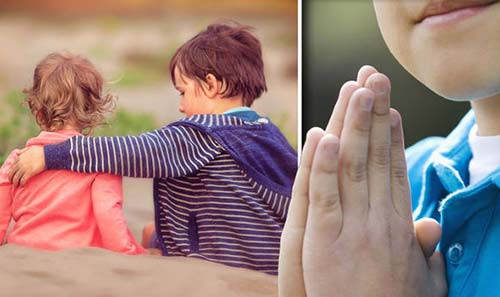Children from religious families are less kind and more punitive than those from non-religious households, according to a new study.
All over the internet and printed in newspapers (the above quote is from the Guardian) is the conclusion of the study that found that religious belief is a negative influence on children’s altruism: ” Our findings robustly demonstrate that children from households identifying as either of the two major world religions (Christianity and Islam) were less altruistic than children from non-religious households.”
The reactions from fundamentalist Christians and fundamentalist atheists are generally as predictable as they are wrong. Most are not reading the actual study; many who are reading the study are not agile in the use and interpretation of statistics. And that includes the conclusion of the actual article.
Lies, damned lies, and statistics
One of the first rules of interpreting statistics is that correlation is not causality. It may very well be that there is a correlation between households practicing a religion and decreasing altruism, but the conclusion that “religion negatively influences children’s altruism” cannot be drawn from that correlation.
The causality may very well flow in the opposite direction: families with cultures that tend to nurture less altruistic children may tend to be attracted to practicing a religion. Those on the lower rungs of Kohlberg’s stages of moral development can find much that religious people preach, dovetailing well (obedience and punishment; reward for good behaviour; conforming to the group; doing one’s duty). Surely it makes sense that religions that proclaim eternal punishment for evil and reward of good will attract those who are more punishment-and-reward orientated.
Some of the most difficult, self-centred people I have met are go to church, and hold significant positions in churches. It would be unusual to have a church community that doesn’t attract and welcome people with (very) difficult personalities. In a secular age, the insecure may be attracted to churches that offer black-and-white (punitive) certainty in the face of the insecurity of our post-modern world-views. Religious people can be arrogant, and can hide behind saccharine piety, and splutter red-faced with “righteous anger” against lists of people and lifestyles in which they have no business whatsoever. They can justify their decisions by quoting dislocated Bible verses, or church teaching, or merely declaring their being right because, “I’ve prayed about it and God told me”.
Jesus himself struggled with religious people. [We just saw that in yesterday’s Gospel reading]. And most religious people had little time for him!
do not do as they do, for they do not practise what they teach. They tie up heavy burdens, hard to bear, and lay them on the shoulders of others; but they themselves are unwilling to lift a finger to move them. They do all their deeds to be seen by others;… woe to you, scribes and Pharisees, hypocrites! For you lock people out of the kingdom of heaven. For you do not go in yourselves, and when others are going in, you stop them. Woe to you, scribes and Pharisees, hypocrites! For you cross sea and land to make a single convert, and you make the new convert twice as much a child of hell as yourselves.
Is it true?
Furthermore, it is important to distinguish truth of religion from the moral behaviour of its adherents. High moral behaviour within a group does not mean its beliefs are more true than that of a group with less ethical behaviour. Religious people may be less altruistic than non-religious, but this does not mean the religious beliefs are untrue, and those beliefs held by the non-religious are true.
Finally, the authors of the study demonstrate their inability to interpret statistics appropriate when they conclude with nonsense such as:
religion negatively influences children’s altruism
and
our findings …call into question whether religion is vital for moral development, supporting the idea that the secularization of moral discourse will not reduce human kindness — in fact, it will do just the opposite.
Even the most elementary secondary-school study of statistics begins with the explanation that correlation is not causality. Merely demonstrating that children from religious families are less kind cannot logically lead to the conclusion that removing the religious component will inevitably make these selfsame children more kind.
Unfortunately, such a conclusion to this study makes the study highly suspect.
If you appreciated this post, don’t forget to click “like” on the the liturgy facebook page, and/or signing up for a not-very-often email. (There is also an RSS feed).




Children from religious households favoured stronger punishments for anti-social behaviour and judged such behaviour more harshly than non-religious children. These results support previous studies of adults, which have found religiousness is linked with punitive attitudes toward interpersonal offences. –
So, children from religious upbringings give less stickers for anti-social behaviour, I will continue reading the paper to see how this correlates into actual giving to charities.
In essence, because of objective moral principles held by religious children, they tend to be more prohibitive about reinforcing negative behaviour.
This allegedly translates into less altruistic giving in relation to charitable giving.
What doesn’t go on to highlight is that religious children tend to be more circumspect or careful about who they give to.
Thanks, Charles. Blessings.
Well spotted Bosco! One of the worst errors uninformed people can make in reading academic studies is to believe that correlation somehow implies causation. As you pointed out, it does not.
If the authors wanted to make a statement on causality they would need a different experimental design -a Randomized Control Experiment (RCT).
-Phil
Thanks, Phil, for reinforcing this important point.
I get the impression they set out to prove what they wanted to prove…
This article (study) has so bugged me. Most educators and those involved with child development ( ie parents ) know that children do not develop an ability to empathise with others until their late teenage years. This study proves nothing significant.